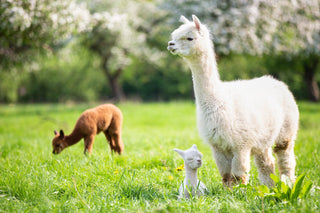Alpaca is one of the oldest domesticated animals in the world. In Peru, where 80% of the world’s alpaca fiber comes from, people have been wearing alpaca fiber for hundreds of years. Alpacas aren't just cute, but they have the power to help the country’s indigenous populations, many of whom suffer from poverty. At least 50,000 families in the Andean highlands rely on herding alpaca for income and to sustain themselves.
Our alpaca fiber comes from animals that live free-range in their native habitat in the Andes Mountains. Alpaca graze on grass and other foliage and are sheared annually, usually in the spring.
Sustainability Considerations
Alpaca are significantly kinder to the environment than sheep or goats
- Our alpaca fiber is produced in the alpaca’s native environment, the Andean highlands.
- Goats and sheep have hooves which can cause land degradation. Alpaca, on the other hand, have padded feet that are gentle and do not harm the earth.
- When alpaca graze, they do not damage or destroy root systems, so land is left undamaged and plants continue growing after an alpaca has eaten it.
- Compared to goats and sheep, alpaca require less water and food.
- Alpaca fiber does not contain lanolin or grease; therefore it is easy to wash without detergents or chemicals.
- Alpaca waste can also easily be used as fertilizer.
Impacts during customer use care
- Because alpaca is naturally odor resistant and somewhat stain resistant, it does not require frequent washing. It is also resistant to wrinkling and recovers from wrinkles well, so very little ironing is required.
- Alpaca can usually be hand washed. Hand washing has a much lower environmental impact than dry cleaning. Alpaca is not as delicate as cashmere, but hand washing still requires careful handling to avoid shrinking and shape distortion.
- Alpaca is fire resistant. Not that it is flame-proof or won't catch fire, but compared to other organic materials, it is slower to ignite.
- A firm, soft brush (also called a sweater brush) can be used to remove pills and return matted fibers to their original position. Sweater combs and shavers can also be used, but can do more damage to the fibers. Wool knits can stretch on a hanger, so are best stored flat.
Alpaca is biodegradable
- Untreated alpaca fiber is completely biodegradable. Things like dye, toxic chemicals, blended fibers and trims can hinder biodegradability. Our alpaca is never treated with chemicals and is only dyed using natural dyes, making it 100% biodegradable
Fur from alpaca is very fine, our cotton is woven differently in order to restrict fibers from protruding through the fabric. The finishes of the cotton is alpaca-proof, but breathable. "The perfect mixture between breathability and alpaca-fiber-proof"
Living in the harsh, wind-swept Andes at elevations above 12,000 feet, alpaca developed a highly sophisticated wool. It’s a natural wonder, prized for its gentle texture and unparalleled performance. It has the delicate feel of cashmere and the functionality of sheep’s wool. It's lightweight, temperature and moisture regulating, flame-resistant, antimicrobial, and hypoallergenic. Once reserved for Incan royalty, alpaca wool is now one of the most sought-after fibers in the world.
We craft our Alpaca Duvet Insert with best practices for safe, sustainable, and renewable textile manufacturing, in compliance with the Global Organic Textile Standard — the gold standard in environmental and social responsibility. The cotton percale encasing the natural alpaca fibers is 100% GOTS organic certified. Organic certified cotton is more breathable than synthetic alternatives. Our duvet insert is not just high-functioning, it’s also better for you, our farmers, and the planet, too. That’s because conventional cotton is a polluted crop grown with toxins. Our cotton is ethically grown in India without pesticides, herbicides or fertilizers.


